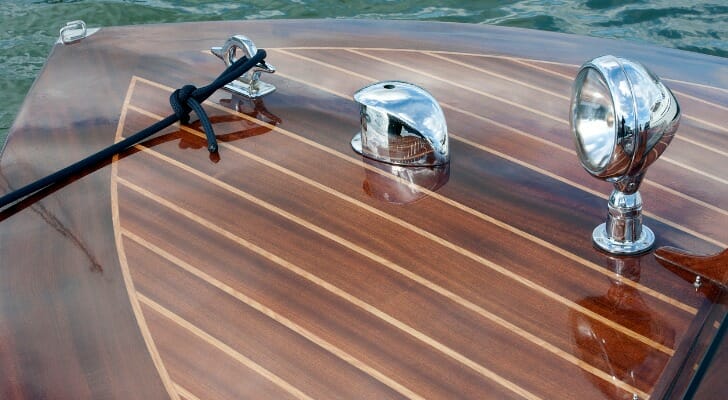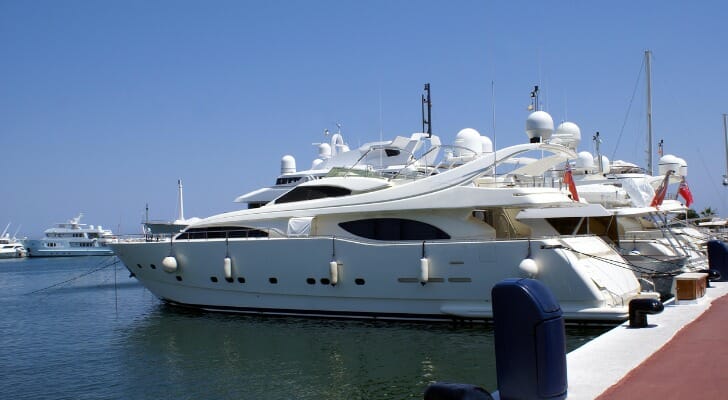How to Buy a Boat
Owning a boat can be a great way to relax with family and friends — or just alone. And, for those interested in making a “statement,” nothing says luxury like sailing along in a big, immaculately...Wednesday, February 19th 2020, 5:06 pm
 Owning a boat can be a great way to relax with family and friends — or just alone. And, for those interested in making a “statement,” nothing says luxury like sailing along in a big, immaculately appointed yacht. But if you’ve never bought a boat before, how do you go about getting one or figuring out which one is right for you? Here are four considerations to review as you decide what kind of boat is best for you and how to pay for it.
Owning a boat can be a great way to relax with family and friends — or just alone. And, for those interested in making a “statement,” nothing says luxury like sailing along in a big, immaculately appointed yacht. But if you’ve never bought a boat before, how do you go about getting one or figuring out which one is right for you? Here are four considerations to review as you decide what kind of boat is best for you and how to pay for it.
Are you heading out to go freshwater or saltwater fishing? Do you want something small, like a trailerable sailboat or an inflatable that can be transported in your car? Or do you envision your vessel as a party platform that can accommodate many people? (Having lots of friends on a boat is fine, but there are two cautions: make sure you know how many people may be on your boat legally and keep in mind that operating a boat, whether under power or sail, under the influence can result in being arrested and your vessel impounded.)
There are many details about the boating world you’ll need to learn before you set sail. Unless you plan to operate your boat in a small lake very little marine traffic, you’ll need to get up to speed on how to interpret the various kinds of buoys that mariners use to keep from running aground. (For example, you should know what “red right return” means.) If you are boating in salt water, make sure you understand when the tides in your area change and how strongly the currents run when the tide is ebbing or flowing.
2. Consider When You’ll Use ItIf you’re in places where leisurely boating is something you can do year-round – like Florida, for example – you might use your boat more than you would in colder areas. If you can get on your boat every couple of weeks, that might be a better investment compared to someone who can get on their boat seasonally.
Even if you live in a place where you can boat whenever you want, do you have the time to do so?
Do you plan on doing some overnight trips on your boat? Unless you’re tied up at a dock or a mooring after sunset, you’ll need a set of lights burning all night – even if you anchor – to reduce the likelihood of a collision with other vessels.
3. Calculate Your Cost Buying a vessel is one thing — and a possibly expensive one at that — but don’t forget to include a few other factors when determining the cost of your boat.
Buying a vessel is one thing — and a possibly expensive one at that — but don’t forget to include a few other factors when determining the cost of your boat.
- Storage. Are you keeping your boat at home or at a local marina? The size of your boat may decide this answer for you since bigger boats might need to go to a boat storage center. On the other hand, it’s often feasible – and far less expensive – to leave boats in the water year-round, and only take them out for a few days every year to clean and paint the hull.
- Towing. How are you going to get your boat into the water? Can you tow it from your home? Some storage centers offer launching and docking, which means you don’t have much more to do than pay someone to handle the heavy lifting. Of course, you can avoid towing costs altogether if you keep your boat in the water or at a marina.
- Operations. Like your car, you’ll need registration and insurance for your boat. If you have a power boat, you’ll also need to pay for oil and fuel as well as engine maintenance. Some of these can be reduced by doing work on your own. A sailboat is often less expensive to own than a power boat simply because it often has no engine or a much smaller engine.
Since the cost of the boat is more than just the purchase price, you’ll want to factor in how much boat you can afford to work into your budget first. Depending on what type of boat you’re interested in, you can avail yourself of helpful calculators that will keep you on budget. Remember, too, that boats can be financed, just like cars, RVs and motorcycles.
A boat doesn’t have to be expensive. If you want a used sailboat between 25 feet and 28 feet long, there are many available for just a few thousand dollars. The same holds true for power boats.
4. Decide Between New vs. UsedLike cars, used boats are much less expensive than new ones. If you’re considering buying a used boat, make sure to have someone check out its condition. You can use someone from the National Association of Marine Surveyors to give you a thorough assessment of the vessel’s condition. Marine surveyors charge, roughly, from $18 to $26 per foot, so surveying a 25-foot boat would cost you from $450 to $650. After you get a survey, you might be able to negotiate the cost of the boat down from the asking price based on problems the surveyor has found.
If you have the means to buy a new boat outright, you have the opportunity to take advantage of the latest technology and gear. You have a manufacturer’s warranty and don’t have to worry about what happened to the boat before you got it. But it does cost much more.
Bottom Line Buying a boat isn’t a quick or easy venture. It can take a lot of time and money to figure out the right boat at the right cost. If you want to get out on the water more often but aren’t committed to buying a boat, you may want to try boat sharing, timeshares or charters. Alternatively, you could join a club that welcomes non-boat-owning members; such clubs offer members the opportunity to crew on other people’s boats. One added advantage of such an approach: you learn to sail for free.
Buying a boat isn’t a quick or easy venture. It can take a lot of time and money to figure out the right boat at the right cost. If you want to get out on the water more often but aren’t committed to buying a boat, you may want to try boat sharing, timeshares or charters. Alternatively, you could join a club that welcomes non-boat-owning members; such clubs offer members the opportunity to crew on other people’s boats. One added advantage of such an approach: you learn to sail for free.
But if you’re ready to buy a boat, remember to factor in the cost of the boat, registration, insurance, taxes and maintenance. If you’re comfortable with handling it, you might be ready to buy a boat.
Tips for Buying a Boat- If you’re not sure whether you’re financially ready to own a boat, it might be wise to run the numbers by a financial advisor. Finding the right financial advisor who fits your needs doesn’t have to be hard. SmartAsset’s free tool matches you with financial advisors in your area in five minutes. If you’re ready to be matched with local advisors who will help you achieve your financial goals, get started now.
- Getting clarity on whether a boat makes financial sense for you depends on having a good sense of your budget. This calculator can help you establish financial boundaries and see if there’s room for a watercraft.
Photo credit: ©iStock.com/pacaypalla, ©iStock.com/pilesasmiles, ©iStock.com/flowersandclassicalmusic
The post How to Buy a Boat appeared first on SmartAsset Blog.
Information contained on this page is provided by an independent third-party content provider. Frankly and this Site make no warranties or representations in connection therewith. If you are affiliated with this page and would like it removed please contact pressreleases@franklymedia.com
More Like This
February 19th, 2020
April 25th, 2024
April 25th, 2024
April 25th, 2024
Top Headlines
April 25th, 2024
April 25th, 2024
April 25th, 2024






